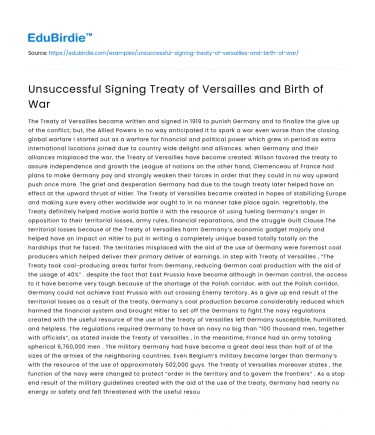Introduction
The Treaty of Versailles, signed on June 28, 1919, was intended to bring an end to World War I by imposing peace terms on the defeated German Empire. While its architects envisioned a treaty that would secure lasting peace, the reality was starkly different. The treaty is often criticized for its punitive measures, which many historians argue sowed the seeds for World War II. This essay explores the unsuccessful nature of the Treaty of Versailles, examining how its terms and conditions contributed to the geopolitical tensions that ultimately led to the outbreak of another devastating war. By analyzing the treaty's economic, political, and social repercussions, this essay will highlight its role as a catalyst for conflict rather than a harbinger of peace.
The failure of the Treaty of Versailles can be attributed to several factors, including its harsh reparations, territorial adjustments, and the exclusion of significant nations from negotiations. To understand the extent of the treaty's shortcomings, it is essential to delve into its specific clauses and their implications for both victors and vanquished. Moreover, addressing counterarguments that suggest the treaty's failure was not solely responsible for subsequent conflicts will provide a comprehensive view of its impact on international relations in the early 20th century.
Save your time!
We can take care of your essay
- Proper editing and formatting
- Free revision, title page, and bibliography
- Flexible prices and money-back guarantee
Economic Repercussions
One of the most contentious aspects of the Treaty of Versailles was the imposition of substantial reparations on Germany. Article 231, often referred to as the "War Guilt Clause," placed full responsibility for the war on Germany and its allies, leading to severe financial penalties. These reparations amounted to 132 billion gold marks, a sum that crippled the German economy and caused hyperinflation in the early 1920s. As noted by economic historian Sally Marks, "the reparation demands were not only economically damaging but also politically inflammatory," exacerbating national resentment and economic instability.
The economic turmoil in Germany had far-reaching consequences. It led to widespread unemployment, poverty, and social unrest, creating fertile ground for extremist ideologies to take root. The economic despair was a significant factor in the rise of Adolf Hitler and the Nazi Party, who capitalized on public discontent by promising economic revival and national rejuvenation. Hitler's aggressive expansionist policies directly challenged the post-war order established by the Treaty of Versailles, setting the stage for World War II.
Critics of this viewpoint argue that the treaty's economic impact was overstated and that Germany's recovery in the late 1920s, known as the "Golden Twenties," demonstrated the potential for economic stability. However, the Great Depression of the 1930s quickly undermined this recovery, highlighting the fragility of the German economy and the lasting effects of the Versailles reparations. Consequently, the economic fallout from the treaty can be seen as a critical factor contributing to the geopolitical tensions of the interwar period.
Political and Social Impact
Beyond economic repercussions, the Treaty of Versailles had profound political and social implications. The treaty's territorial provisions redrew the map of Europe, resulting in significant territorial losses for Germany. The annexation of Alsace-Lorraine by France, the creation of the Polish Corridor, and the loss of colonies fueled nationalist resentment within Germany. According to historian Antony Lentin, "the sense of humiliation and betrayal engendered by the treaty was a potent force in German politics, driving the narrative of victimhood that the Nazis would later exploit."
The treaty also failed to address the aspirations of various ethnic groups within Europe, leading to the creation of several unstable states. The dissolution of empires and the subsequent emergence of new nations, such as Czechoslovakia and Yugoslavia, resulted in ethnic tensions and border disputes. These divisions were further exacerbated by the principle of self-determination, which was inconsistently applied, leaving many groups dissatisfied and marginalized.
Proponents of the treaty argue that it succeeded in establishing the League of Nations, an international body aimed at preventing future conflicts. However, the League's inability to enforce its decisions and the absence of key powers, such as the United States, rendered it ineffective. The treaty's failure to create a stable and inclusive political order contributed to the rise of authoritarian regimes, which capitalized on the social and political discontent that pervaded Europe during the interwar years.
Conclusion
In conclusion, the Treaty of Versailles, rather than securing a sustainable peace, became a catalyst for further conflict. Its punitive economic measures, coupled with its political and social ramifications, created an environment ripe for the resurgence of militarism and nationalism. While some argue that external factors, such as the Great Depression, played a more significant role in the lead-up to World War II, it is clear that the treaty's shortcomings were instrumental in shaping the volatile geopolitical landscape of the 1920s and 1930s.
The lessons of the Treaty of Versailles underscore the importance of crafting peace settlements that promote reconciliation and stability rather than retribution and division. As the world continues to grapple with conflicts and peace-building efforts, the legacy of the Treaty of Versailles serves as a poignant reminder of the complexities and challenges inherent in the pursuit of lasting peace. By understanding its failures, policymakers can strive to create more effective frameworks for conflict resolution and international cooperation in the future.






 Stuck on your essay?
Stuck on your essay?

